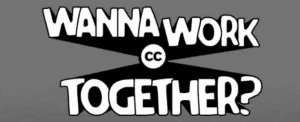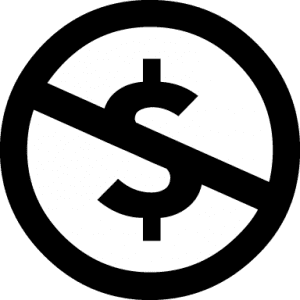Why I Am Backing Away from Creative Commons
 Back in 2002, Creative Commons (CC) launched version 1.0 of of its licenses. It was an immediate fascination for me and an immediate love affair.
Back in 2002, Creative Commons (CC) launched version 1.0 of of its licenses. It was an immediate fascination for me and an immediate love affair.
At that time I was operating a small poetry/literature site and I had always been happy to share my works. I was fortunate enough to have my work appear, with attribution, in countless anthologies, collections, newsletters, personal home pages and even some printed collections. It enthralled me to see my work being spread and I even allowed some musicians to turn my poems into songs.
Creative Commons seemed like the next evolution in that policy. Rather than a poorly-drafted license and countless emails requesting reuse, I could use a license written by a professional to convey almost exactly the same thing I had been doing for six years at that point. It seemed too good to be true, especially too good to be free.
I’ve watched over the next 13 years as Creative Commons has grown in every regard. It’s licenses are everywhere and are integrated with sites like YouTube and Flickr. The organization itself has also grown, into a multi-million dollar charity that’s expanded far beyond its initial goals of drafting and supporting the licenses.
But somewhere in the midst of that growth, I’ve begun to realize that, for me at least, Creative Commons has stopped living up to its promise. It’s no longer a tool to streamline creativity and cooperative sharing, but rather, it has become a tool for spammers, scrapers and others who simply want to extract benefit and take shortcuts rather than create something new.
While the licenses are unchanged, I can no longer deny that the uses I’m seeing have changed drastically and not for the better, making it a poor deal for at least myself and likely for many other creators.
Why I Was Drawn to CC
 For me, the lure of CC was straightforward. Ever since I started posting on the Web, I was both excited by the idea of online collaboration and wanting all of the help I could get spreading my work to new readers. That’s why I had always had a liberal reuse policy, one that allowed others to copy/share/repost my content, so long as they attributed it correctly and, ideally, provided a link back.
For me, the lure of CC was straightforward. Ever since I started posting on the Web, I was both excited by the idea of online collaboration and wanting all of the help I could get spreading my work to new readers. That’s why I had always had a liberal reuse policy, one that allowed others to copy/share/repost my content, so long as they attributed it correctly and, ideally, provided a link back.
The reason this site is called Plagiarism Today and not “Copyright Today” is because, when dealing with infringement of my own work, I never targeted someone who attributed the content. I was only concerned with plagiarism. Sure, I still had at least 700 plagiarists to deal with, but I had an equal or greater number of places I was completely fine with my work being on.
When Creative Commons came to be, it seemed like an easy way to streamline and legitimize what I was already doing. I jumped on the 1.0 bandwagon within an hour of learning about it.
When I launched Plagiarism Today in 2005, I didn’t think twice about making CC a part of it. There, the partnership also flourished. For example, Plagiarism Today is cited over 100 times in Google Scholar (something that blows my mind) and many of those researchers used the CC license to more easily integrate my writing into their work beyond just a fair use.
I also never found my support and use of CC to be in conflict with my pro-copyright convictions (and still don’t). Creative Commons Licenses are a tool. If a content creator is best supported by having a more open licensing policy, CC licenses make it so they can do so without the expense of hiring a lawyer to draft the license and a graphic designer/writer to explain the terms.
Creative Commons is not, never has and never will be right for everyone. However, CC licenses are a choice and, by being pro-copyright, I also support the right of creators to choose whatever licensing strategy best suits them, CC, All Rights Reserved or something else.
While all of that is still true, the relationship, for me at least, has soured over recent years. In 2014 I looked at the supposed SEO benefits of Creative Commons and found the benefits to be minimal at best, very risky at worst.
Over the past few years, it’s simply become clear that, for me and this site, Creative Commons is a bad deal and the time has come to part ways.
Parting is Such Sweet Sorrow
 The spirit of Creative Commons, to me, has always been about symbiosis. I, as a creator, grant a broad license to my work and others will take it, share it, build upon it. They will get to use the work to help with their ends, but will also help me reach new people and I get the thrill of seeing great new things done with my work.
The spirit of Creative Commons, to me, has always been about symbiosis. I, as a creator, grant a broad license to my work and others will take it, share it, build upon it. They will get to use the work to help with their ends, but will also help me reach new people and I get the thrill of seeing great new things done with my work.
After all, my business model is a consulting one, though I am trying out Patreon, I don’t sell the work on this site and primarily use it to inform others and promote my business. The more sharing (with attribution) theoretically the better.
However, ever since I first started with CC, there have always been some people who went against that spirit. Spammers, scrapers, etc who want to do the bare minimum to meet the requirements of the license and use the content in a way that contributes as little as possible back to the source.
What’s changed is that now nearly all of the people who use my work under a CC license can be described this way.
Some of this has had strange consequences. Recently, I learned about a YouTube account that had reposted a CC-BY licensed video I had posted. The account is a spam account, with nothing but other CC videos. But it makes it appear the video went live in April 2014 when the original actually went live in May 2012. That’s a big deal considering major developments in the story had happened between those two dates.
These types of uses help the spammer build up questionable accounts, of which maybe one or two videos or posts will attract any attention. However, for the creator, there’s no new audience being reached, no creative use of the work and no practical benefit. In fact, given that Google has been on a warpath against “unnatural” links, a lot of reuse of your content by spammers can lead to search engine penalties and deeply hurt your site.
In a way, I wonder if this move was driven by people like me. Spammers have become so frustrated by copyright notices and account closures that they’ve latched on to Creative Commons as a means of easily filling their blogs, channels and accounts. Much like how spammers polluted article marketing, they’re slowly doing the same to Creative Commons.
While Creative Commons was an interesting solution to preventing scraping 8 years ago, the nature of Web spam has changed and, looking at just my experience, Creative Commons went from being a shield against being spammed to an invitation.
The Time Issue
One of the things that Creative Commons should be able to help with, is the hassle of dealing with reuse requests. A blanket license means that no one has to ask permission unless they want to use the content out of the boundaries of the license.
While I understand that others want to be very careful with a site named Plagiarism Today, the number of reuse requests I’ve gotten has risen steadily, pretty much all of which would be allowed under the license.
Though some of these cases are simply situations of someone not seeing or understanding the license, many times it’s not. That’s because, when I point to the CC license, I’m told that their school district, their university, their publisher or their lawyer won’t let them rely on it. For some, it’s the issue of false Creative Commons Licenses and the need to confirm that I’m the original author, other times it is a simple lack of faith in the license itself and a desire to use their own.
The result of this is that few legitimate (IE: Non-spam) reuses of my content are under my Creative Commons License and that trend has been increasing, not going away as more people learn about the licenses.
In fact, none of the top 100 referrers to Plagiarism Today in the past month used the Creative Commons License. A one word link on a month-old blog post generated more traffic than any CC-licensed use. (Thank you for the link and great job on the article Violently Domestic!)
In short, spammers have been the primary users of my Creative Commons content (both here and on YouTube) and most of those who have wanted to make non-spam use of my content have instead approached me directly, eliminating the time benefit of having a Creative Commons license.
The end result is that Creative Commons is no longer a good fit for me or this site.
What’s Next
To be clear, the Creative Commons License hasn’t been removed from this site yet. I’m intentionally leaving it on the site as I publish this article. Not only in hopes that this article can inspire a conversation around Creative Commons (one that can be furthered with the license), but because I’m still putting into place my exit strategy.
First thing is first, I can not revoke the Creative Commons License and would not if I could. If you are using something on this site under the license, then please feel free to continue. I have no desire to stop you and no ability do so if I did.
Second, some time in the near future, the Creative Commons License will disappear from the site and I’ll replace it with a “Request Reuse” form. The rules for the reuse will be largely unchanged. They just won’t be completely automatic. Pretty much anyone who asks and makes a reasonable request will be granted permission.
This might seem inconvenient to those requesting permission and I would agree. However, it’s in line with how most people have been asking for permission, namely through my contact form. This way, I can gather the needed information up front and respond quickly, saving myself and those wanting to reuse my work time.
Simply put, if the comfort level isn’t there to eliminate the need for permissions requests, I need to develop the most streamlined version that I can, for everyone’s sake.
As for YouTube, I’ll be moving all of my videos to the traditional All Rights Reserved license but I will be including links to the reuse form in my channel and I may include it in all video descriptions if it seems like it’s necessary.
In short though, the goal is not to stop reuse of my content, but to recognize that the nature of copying has changed over the past 10 years and that a blanket license, for this type of content, is an invitation to the wrong crowd.
I want to help legitimate uses of my content grow while keeping those who might harm my site (or my reputation) at bay.
Bottom Line
I know that this piece is going to seem like a criticism of Creative Commons, but I don’t intend it to be. Though I do have other qualms with the organization, this is solely based on observation of my personal experiences over the past 10 years.
I still believe that there are many creators for whom Creative Commons is appropriate. This is especially true for research and collaborative projects, such as Wikipedia, all of which is emphasized heavily on the Creative Commons site. It’s only this site, this content and this exact work I’m talking about with this post.
That’s because my story is an anecdote. I realize that the word anecdote, even in its plural, is not a synonym for data. Without data, I can’t and won’t make broader judgments.
However, after recent events, I found myself reevaluating my relationship with Creative Commons. Looking through my emails, my referrers and other information I have on hand, realizing that a lot has changed in the past decade and that Creative Commons is not a good fit for Plagiarism Today.
I think a different system, one more in tune with how people actually seek permission to use my work, will help others build off of what I’ve created.
In the end, my hope is that the removal of the Creative Commons License doesn’t lead to less collaboration, but rather, to more of it. Offering a clear path to permission that those who reuse my work are comfortable with may do exactly that.
Even if it means removing the blanket license.
Want to Reuse or Republish this Content?
If you want to feature this article in your site, classroom or elsewhere, just let us know! We usually grant permission within 24 hours.
